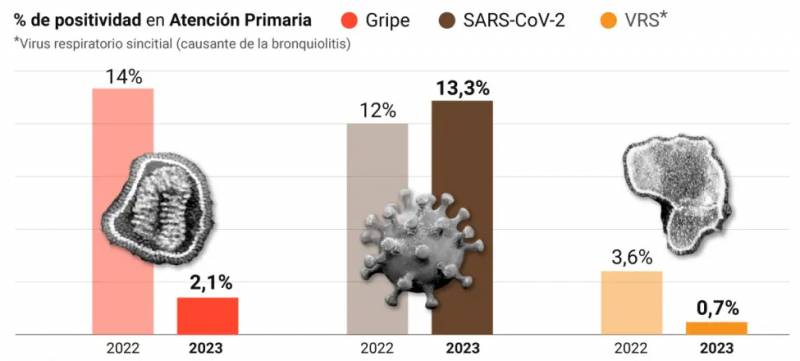
To be listed on the CAMPOSOL TODAY MAP please call +34 968 018 268.
article_detail
Date Published: 07/11/2023
Covid, flu and bronchiolitis kept at bay by high temperatures in Spain
Now that the Spanish winter is setting in, health experts expect respiratory illnesses to increase

It’s less than two months until we say goodbye to 2023 but the epidemic season, which usually heralds a huge upsurge in respiratory illnesses, has barely begun. This is largely because the temperatures have only started to drop in the last few days, and most of the usual complaints, such as coronavirus, influenza and bronchiolitis, are exacerbated by the cold.
A report from the National Epidemiological Surveillance Network shows that in the last three weeks, the positivity rate of Covid has hit 13.3%, flu stands at 2.1% and respiratory syncytial virus (RSV), which causes a range of bronchial complaints, has reached just 0.7%.
These figures are quite staggering when compared to 2022, when the weather wasn’t quite so mild. At this exact same time last year, SARS-CoV-2 positivity was 12%; flu, 14%; and RSV, 3.6%.
However, now that the temperatures are starting to drop, primary care physicians expect to see and increase in all of these illnesses.
“Cases of flu and RSV are increasing, but very slightly. At the moment we are seeing very little and, of flu, especially type A,” explained Rodrigo Abad, a family doctor in Asturias and member of the infectious diseases group of the Spanish Society of Primary Care Physicians (Semergen).

Paediatric consultations, he said, are typically very seasonal but because autumn came so late this year, infections didn’t begin to increase until the end of October – almost a month later than normal.
This is all likely to change over the coming days and weeks though with an uptick in RSV illnesses, which start to circulate in earnest when the weather changes.
“These symptoms begin with cough, runny nose and sometimes even fever and, after two or three days, they evolve with some type of respiratory difficulty,” Mr Abad said. RSV is most active in very young children and babies, as well as the elderly, and frequently results in a hospital stay.
This is the first year the Spanish government has decided to immunise all infants under six months against RSV and although cases of bronchiolitis have picked up since the beginning of November, this infection doesn’t usually reach its peak until mid-December.
On the other hand, the flu season will take hold in the middle of next month and last until February or March.
According to the Spanish Vaccinology Association, last year respiratory diseases were the third leading cause of death in Spain, resulting in 42,979 fatalities. To prevent such worrying numbers in 2023, the organisation has launched ‘The best plan for this winter’ campaign to raise awareness of the importance of vaccination in people over 60 years of age and younger people with more vulnerable health.
In other news: 100 Moroccans try to scale the border fence into Spain
Image 1: Freepik
Image 2: ISCIII
Loading
Read more about Coronavirus:
OR
Sign up for the Spanish News Today Editors Roundup Weekly Bulletin to get a comprehensive email with all the week’s news for Spain, Murcia, Alicante and Andalucía.
Get a sneak peek – here are a few of our recent Subscription Bulletins:
50% Discount Special Offer subscription:
24.95€ for 48 Editor’s Weekly News Roundup bulletins!
Please CLICK THE BUTTON to subscribe.
Contact Murcia Today: Editorial 000 000 000 /
Office 000 000 000
























